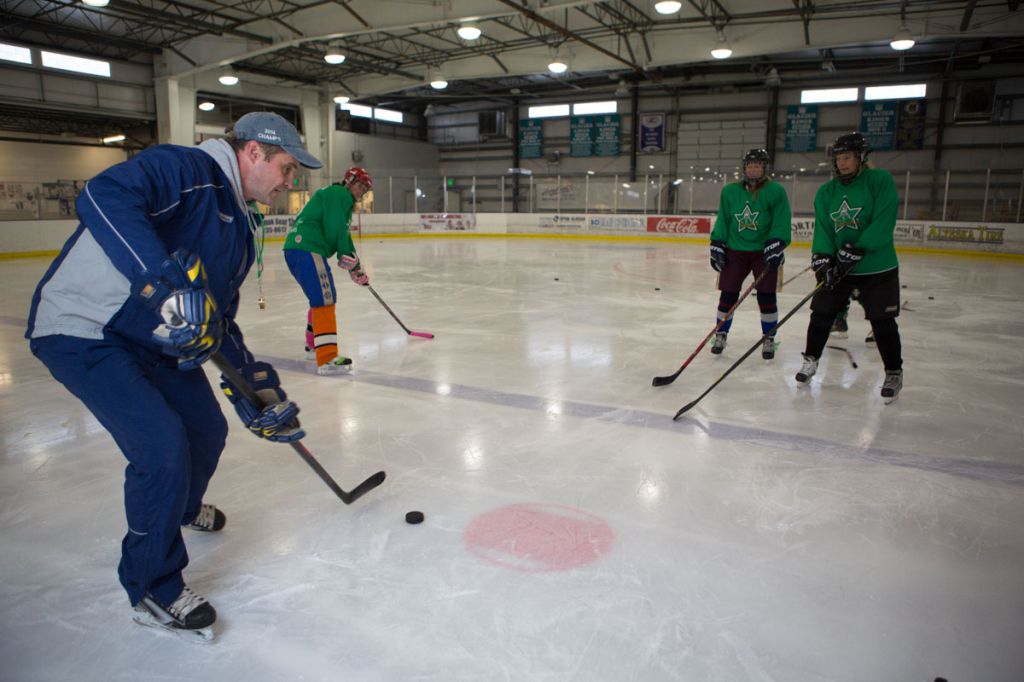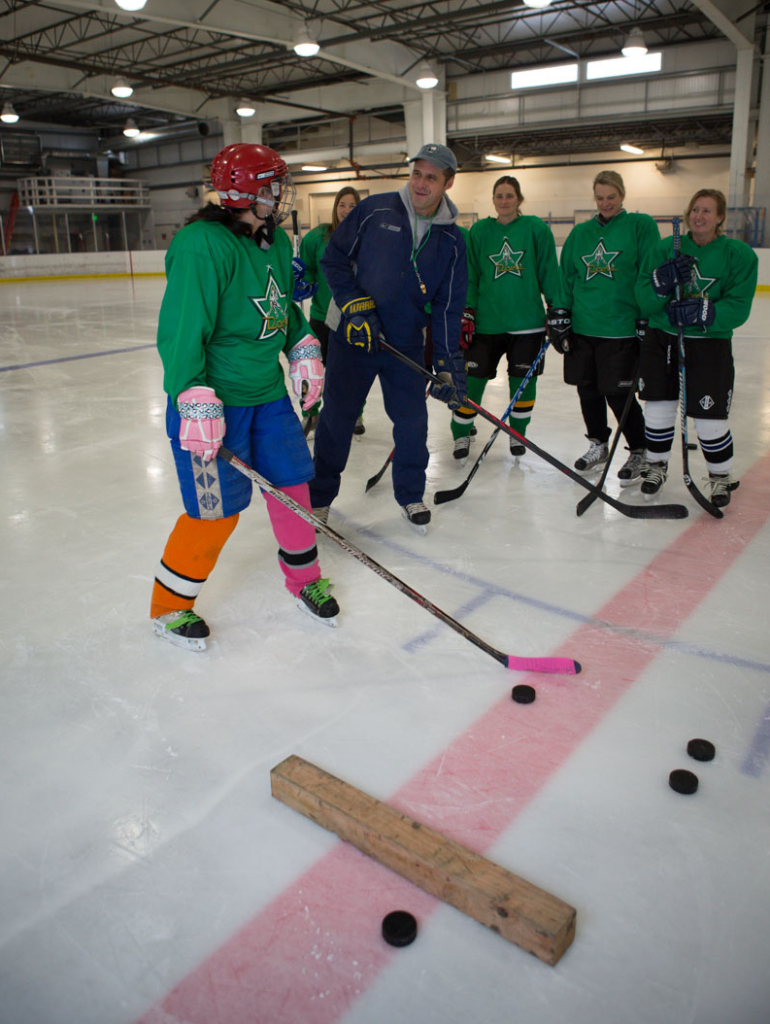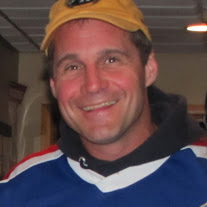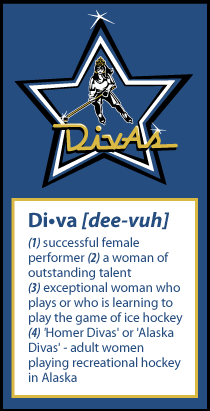Are you ready to coach?
If you want to (or are asked to) coach women’s adult recreational hockey, there are a few questions you will need to ask yourself.
Can you connect with this group? Do you have the energy? Can you constantly remember that everyone is here to play and have fun?
Just because you played hockey once doesn’t mean you can coach. To coach you have to think about the mechanics of what you may be able to seemingly do naturally. Are you able to break down any skill into component parts so it is understandable and replicable?
 Don’t be condescending. If you are a left handed shot try this. Grab a right handed stick, take a puck, and try to shoot it top shelf. You will probably shoot just like a beginner. You might “shoot like a girl”. Ok, now get to work on figuring out how to teach a new player to shoot a wrist shot. It’s not as easy as you think. You will struggle with figuring out how to instruct, or you will not be much of a coach.
Don’t be condescending. If you are a left handed shot try this. Grab a right handed stick, take a puck, and try to shoot it top shelf. You will probably shoot just like a beginner. You might “shoot like a girl”. Ok, now get to work on figuring out how to teach a new player to shoot a wrist shot. It’s not as easy as you think. You will struggle with figuring out how to instruct, or you will not be much of a coach.
Everyone is here to play a game – the fastest, most fun and challenging team game ever invented. Many of your players are trying something for the first time. They want to develop skills because it is more fun to be competent. The challenge is there. The outward results may appear to be developing slowly, but the playfulness and fun is the constant.
Your team is probably not asking you to help so you can be an inspirational leader or to deliver great pregame speeches. They are adults playing recreational hockey. They need help acquiring hockey skills that are relevant to their level of development.
The most important question: Can you connect?
With the Divas I often make myself back up and simplify when I’m not seeing the gains I hope for. If someone was trying to teach me a new dance it would need it to be super simple, repeated often, with a simple statement (mantra) I could say in my mind. After the basic steps, I would need to add the rhythm and it may be a while before there would be anything that resembled dancing, and even longer before there would be any smile on my partner’s face.
Tip: you won’t connect without energy and you won’t have energy if you are not having fun.
Are you willing to help work with a program and not get any credit for it? Would you be ok with that?
First of all it is their team, not yours. There is an abundance of creativity, management experience and expertise already involved. They already know most of how to run a team/program. Ask them what you can do for them. Offer, don’t impose. You are a facilitator for a fun activity and if things go well over time you may become their mentor/coach.
With the Divas I’m just a facilitator. It’s their program. I do as much as I’m asked. They run the show. Several times over the years I’ve joked, “I’m clearly not qualified to coach you” when they are being Diva-like.
Can you coach all of your players – not just the good ones?
Coaches tend to gravitate to where the talent is. Coaches often think that if they aren’t producing top players it is a reflection of their lack of coaching prowess. So if you start with more talent you will look better and shine in the success of your team’s accomplishments. You will be able to move up the coaching ladder to again coach more talented players and generate more successful teams. This leads to “half of you should just quit!”
If a coach was going to write a complimentary book about his/her team, a reader might ask, “What’s all the fuss about? They don’t look so great to me.” Remember visible progress with your women’s recreational team may be painfully slow, but I assure you if you are patient and help create the right environment your team will improve. You will know it. Your players will know it. It may not be readily apparent to an outside observer.
You will be surprised at how much your players can improve if you stick with it. After my first year of coaching I was given our hockey association’s Kevin Bell award – the highest honor I’ve ever received. The Diva who presented me the award said that the thing that the Divas appreciated most was that I coached EVERYONE, not just the top players. Coaching all the players was my biggest struggle but also where I made the biggest strides in understanding. The experience of coaching women in general and the least experienced players in particular is what has made me consider myself a competent coach. I never felt that I was competent until I had to break down the mechanics, get down to the fundamental elements, and realize what deep practice means. Only then did I feel confident in my role as a teacher of technique. When a group of players is offering thanks to me for coaching I tell them that I have received much more than I have given, and I am grateful for that.
The Divas have some shining examples of players who could not even skate down the ice their first practice who now dangle in a crowd, cycle out of the corners, give and go, deke goaltenders, and generally make a coach smile with delight. Some other Divas haven’t made the progress over several years that I’d hoped for, but I truly know they are advancing, feeling confident, having fun, and enjoying the camaraderie of their team. On the flip side I also see players who used to score and outskate most Diva players who stopped coming to practice or moved to another town, and now they just fit in. Everyone around them has gotten better, and they no longer stand out.
Can you work closely with a collaborator in your program?
It is very important to have a collaborator on your team for feedback. That would be the captain traditionally. But with the Divas there is one exceptional organizer and leader, Ingrid, and I also have my wife, Shelly, who will gladly tell me when I’m making no sense. You surely will have someone who is a natural leader and organizer – the consultant.
We are lucky. Because we have built our program on mutual respect and trust, many individuals will step up and ask questions or give input when its appropriate, or know when its best to lay back and let it happen. As a coach I love questions. It gives my some idea of where players are and how they are interpreting the information I’m trying to give. Sometimes Shelly or Ingrid will step up and ask questions about my explanations of drills. They make me clarify, use more visual aids, or further describe what we are trying to do. (Note of Self-criticism: I sometimes leave my explanations of drills a little vague. Time is short when you are on the ice. I don’t mind seeing the struggle to understand. Hockey is a thinking game. I’d rather see those who think they understand a new drill step up and be the first in line. That gives the players who are confused some time to pick up the patterns. Watching the Divas explain things in line on ice to their teammates is better than me going over it again. )
The thing that I’ve talked most about with the Diva collaborators the first five years of the program was how to get the formula right on how to integrate new to hockey players with more experienced players so everyone can have a good skate, learn skills, stay safe, and have fun.



